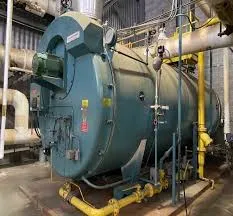
Dec . 20, 2024 05:06 Back to list
hot water boiler operating temperature
Understanding the Operating Temperature of Hot Water Boilers
Hot water boilers play a crucial role in various industries, households, and commercial settings. They are designed to heat water for various applications, including space heating, sanitation, and process heating. A vital aspect of boiler operation is understanding the significance of operating temperature, which directly impacts efficiency, safety, and overall performance.
Importance of Operating Temperature
The operating temperature of a hot water boiler is critical for several reasons. Firstly, it affects the boiler's efficiency. Most hot water boilers are designed to operate within a specific temperature range, typically between 140°F and 200°F (60°C to 93°C). Operating outside of this range can lead to efficiency losses. For instance, if the water temperature is too low, the boiler may not achieve optimal heat transfer, leading to higher energy consumption and increased utility bills. Conversely, operating at excessively high temperatures can cause thermal stress on the boiler components, potentially shortening its lifespan.
Moreover, maintaining the appropriate operating temperature is essential for safety. Overheating can lead to pressure build-ups within the boiler system, potentially resulting in dangerous situations such as boiler explosions or system failures. To mitigate these risks, modern hot water boilers are equipped with safety devices that monitor operating temperature and pressure. These devices can shut down the boiler when operating parameters exceed safe limits, ensuring user safety.
Factors Influencing Operating Temperature
Several factors influence the operating temperature of a hot water boiler, including system design, fuel type, and external conditions. The design of the boiler, including its size and the materials used in construction, determines how efficiently it can operate at various temperatures. Larger systems may require higher temperatures to adequately heat expansive spaces, while smaller systems may function efficiently at lower temperatures.
The type of fuel used can also impact the operating temperature. For instance, natural gas boilers often operate differently than electric or oil-fired boilers. Each fuel type has its combustion characteristics, affecting how heat is generated and how efficiently it is transferred to the water.
hot water boiler operating temperature

External conditions, such as ambient temperature and demand for hot water, also play a role in determining operating temperature. For example, during colder months, the system may need to operate at higher temperatures to meet increased heating demands. Conversely, in warmer seasons, the system can function efficiently at lower temperatures.
Optimizing Operating Temperature
To optimize the operating temperature of a hot water boiler, regular maintenance and monitoring are essential. Routine inspections help identify any issues that may affect the boiler's performance. This includes checking for scale buildup, which can impede heat transfer and necessitate higher temperatures to achieve the desired output. Regular flushing of the system can help mitigate this issue.
Installing advanced control systems can also enhance efficiency. Modern boilers often come equipped with digital control panels that allow users to set precise temperature limits. By utilizing these controls, operators can ensure that the system operates within the optimal temperature range according to the current demands.
Additionally, insulation of pipework and storage tanks can prevent heat loss, allowing the system to maintain its desired temperature with less energy input. This results not only in cost savings but also in reduced environmental impact.
Conclusion
In conclusion, understanding the operating temperature of hot water boilers is essential for achieving maximum efficiency, safety, and longevity of the system. By considering factors such as system design, fuel type, and environmental conditions, users can optimize operation and reduce energy costs. Regular maintenance and the use of modern control technologies further enhance performance, ensuring that hot water boilers meet the demands of users effectively and safely. Knowing and managing operating temperatures not only aids in efficient boiler operation but also contributes to a safer and more sustainable environment.
-
High-Efficiency Commercial Oil Fired Steam Boiler for Industry
NewsJul.30,2025
-
High-Efficiency Biomass Fired Thermal Oil Boiler Solutions
NewsJul.30,2025
-
High Efficiency Gas Fired Thermal Oil Boiler for Industrial Heating
NewsJul.29,2025
-
High-Efficiency Gas Fired Hot Water Boiler for Sale – Reliable & Affordable
NewsJul.29,2025
-
High Efficiency Biomass Fired Hot Water Boiler for Industrial and Commercial Use
NewsJul.29,2025
-
High-Efficiency Biomass Fired Hot Water Boiler for Industrial Use
NewsJul.28,2025
Related PRODUCTS






















